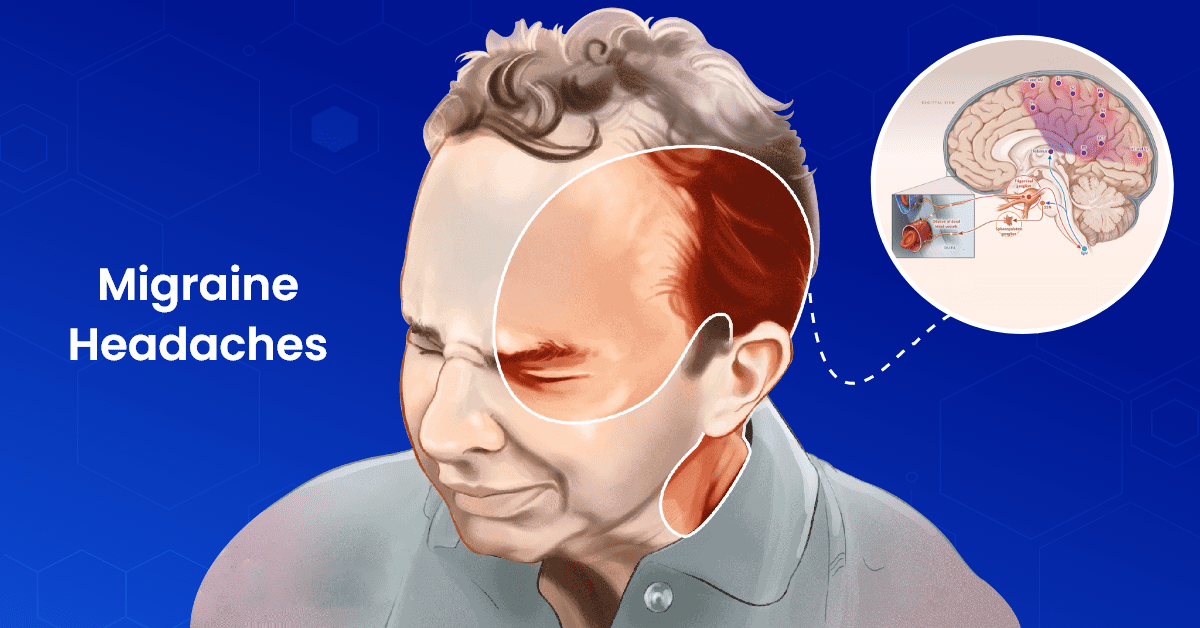Best Migraine Doctors in Kansas City

Migraine Treatment Offered by Kansas Pain Management
- Botox
- Spinal Cord Stimulation (SCS)
- Sphenopalatine Ganglion Block
- Supraorbital Nerve Block
- Occipital Nerve Block
- Radiofrequency Ablation (RFA)
- IV Infusion Therapy
What is a Migraine Headache?
What are the Types of Headaches?
There are over 200 different types of headaches that are divided into two main categories: primary headache and secondary headache. A primary headache is one that develops on its own and not as a result of another health problem. The most common types of primary headache include tension-type headache, migraines, and cluster headaches. A secondary headache is one that results from another health problem.
What are the Types of Migraines?
Migraine without Aura
Migraine with Aura
Retinal Migraine
Migraine With Brainstem Aura
Status Migrainosus
How are Migraines Diagnosed?
A healthcare practitioner must recognize a pattern of recurrent headaches, the accompanying symptoms, and the medical and family history in order to make an accurate diagnosis.
Conditions
- Arthritis
- Cancer Pain
- Chronic Pelvic Pain
- Chronic Abdominal Pain
- Cervical Radiculopathy
- Complex Regional Pain Syndrome
- Compression Fractures of the Spine
- Diabetic Neuropathy
- Fibromyalgia
- Herniated Discs
- Knee Pain
- Low Back Pain
- Migraine Headaches
- Neck Pain
- Neuropathy
- Post Laminectomy Syndrome
- Shoulder Pain
- Trigeminal Neuralgia
- Whiplash CAD
Treatments
- Botox Injection
- Capsaicin (8%) Patch
- Cervical Epidural Steroid Injection
- Disc Nucleoplasty
- Dorsal Root Ganglion Stimulator (DRG)
- Endoscopic Discectomy
- Facet Joint Syndrome
- Hip Joint Injections
- Intrathecal Pain Pump
- Intercostal Nerve Block
- Ketamine Infusion
- Knee Joint Injection
- Kyphoplasty
- Lidocaine Infusion
- Lumbar Epidural Spinal Injection (LESI)
- Lumbar Sympathetic Ganglion Block
- Lumbar Radiofrequency Neurotomy
- Minuteman Procedure
- Medial Branch Block (MBB)
- Minimally Invasive Lumbar Decompression (MILD)
- Platelet Rich Plasma
- Peripheral Nerve Stimulation
- ReActiv8 Procedure
- Radiofrequency Ablation (RFA)
- Regenerative Medicine
- SI Joint Injection
- Stellate Ganglion Block
- Sympathetic Nerve Block
- Spinal Cord Stimulation (SCS)
- Spinal Stenosis
- Trigger Point Injection
- Transforaminal Epidural Spinal Injection (TFESI)
- Vertebroplasty
- Vertiflex Procedure
What Triggers a Migraine?
Hormonal Changes: Female patients tend to have migraines more frequently right before and right after their menstrual periods.
Food and Drinks: Excessive alcohol or caffeine consumption can often trigger a migraine, as well as skipping meals and being dehydrated.
Irregular sleeping Patterns: For some patients, not sleeping enough or sleeping too much can trigger a migraine as well.
Weather changes: A migraine may be caused by a change in the weather or barometric pressure.
Migraine Treatment
Botox
Acupuncture
Biofeedback
Injectable Medications
Nerve Blocks
Kansas Pain Management - Treatment Philosophy For Migraine Headaches
Conditions
- Arthritis
- Cancer Pain
- Chronic Pelvic Pain
- Chronic Abdominal Pain
- Cervical Radiculopathy
- Complex Regional Pain Syndrome
- Compression Fractures of the Spine
- Diabetic Neuropathy
- Fibromyalgia
- Herniated Discs
- Knee Pain
- Low Back Pain
- Migraine Headaches
- Neck Pain
- Neuropathy
- Post Laminectomy Syndrome
- Shoulder Pain
- Trigeminal Neuralgia
- Whiplash CAD
Treatments
- Botox Injection
- Capsaicin (8%) Patch
- Cervical Epidural Steroid Injection
- Disc Nucleoplasty
- Dorsal Root Ganglion Stimulator (DRG)
- Endoscopic Discectomy
- Facet Joint Syndrome
- Hip Joint Injections
- Intrathecal Pain Pump
- Intercostal Nerve Block
- Ketamine Infusion
- Knee Joint Injection
- Kyphoplasty
- Lidocaine Infusion
- Lumbar Epidural Spinal Injection (LESI)
- Lumbar Sympathetic Ganglion Block
- Lumbar Radiofrequency Neurotomy
- Minuteman Procedure
- Medial Branch Block (MBB)
- Minimally Invasive Lumbar Decompression (MILD)
- Platelet Rich Plasma
- Peripheral Nerve Stimulation
- ReActiv8 Procedure
- Radiofrequency Ablation (RFA)
- Regenerative Medicine
- SI Joint Injection
- Stellate Ganglion Block
- Sympathetic Nerve Block
- Spinal Cord Stimulation (SCS)
- Spinal Stenosis
- Trigger Point Injection
- Transforaminal Epidural Spinal Injection (TFESI)
- Vertebroplasty
- Vertiflex Procedure
